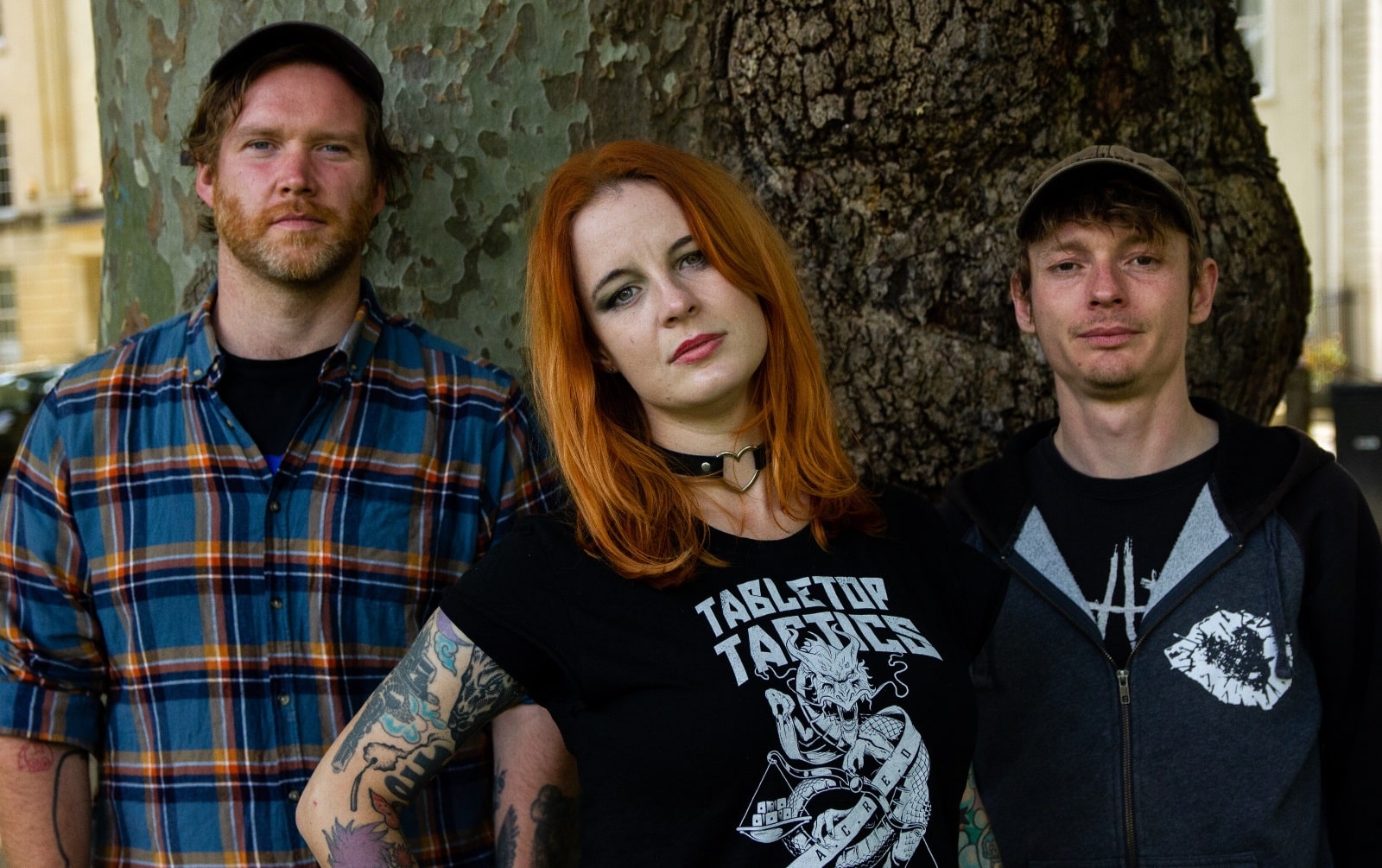Having lost none of their gut-punching energy, multi-disciplinary post metal four-piece SVALBARD have redefined post-metal and delivered an emotive opus for the ages. Their new album “When I Die, Will I Get Better?” comes as a powerful, eight track anthology of personal and societal highs and lows, with each track telling a tale, putting one topic or one incident under vocalist and lyricist, Serena Cherry’s thoughtful gaze; she picks at the scabs to reveal another raw piece of the overall creative puzzle beneath.
Written across several months in 2019 and early 2020 the chronology takes a myriad of twists and turns, through inner turmoil, personal reflection, and external observations. Inspiration is spun out of the day-to-day as much as it is out of extreme moments of anguish or clarity. With themes of sexism, misogyny, abuse and mental health at the core of the oeuvre, When I Die, Will I Get Better? is a shadowy ride through the author’s psyche.
Today, we are stoked to give you our special feature with 8 thingsthat inspired their newest work, along with first-hand commentary! Check it out below the band’s photo below.
Following the recent demise of Holy Roar last week, and recent developments at Holy Roar Records, SVALBARD have today announced new release details for their upcoming album release, When I Die, Will I Get Better?. With all ties severed with their previous label, they will now release their third full-length album via Church Road Records – the new venture of former Holy Roar label manager, Justine Jones. The release date remains 25 September; pre-orders are now available via Church Road Records. Translation Loss will release the album in North America, and with the label having no affiliation to Holy Roar, all aspects of their release remain unchanged.
The band have issued the following statement: “We are fortunate to have worked with Justine for many years, her passion, dedication and label knowledge has been instrumental in our growth as a band. She’s a person in the music industry who genuinely cares. We are proud to be releasing this record on Church Road Records. “Justine is doing everything she can to keep the release on track, however please be patient if minor delays occur along the way or if things continue to appear online under the Holy Roar label during the transition period – we will keep everyone informed via our socials of all developments. We will be donating a portion of each record sale to Rape Crisis. We have chosen to support this charity as their centres, helplines and campaign for change against sexual assault are so desperately needed in these times. We would like to say a huge thank you to our fans for being understanding, supportive and patient – and to Justine and Sammy at Church Road Records for all their hard work ensuring our album still gets released.”
In addition, Justine Jones commented: “I am very excited to announce that I have joined my husband (Sammy Urwin) and will be releasing bands under our label Church Road Records. With the help of former Holy Roar staff members, Wil and Sam, we will be bringing you the best heavy music that the world has to offer. I have worked and toured with SVALBARD over the last seven or so years and am delighted that I will continue working with them, as well as donating money to a brilliant cause. All hail the riff.”
Pre-orders that have been made via Holy Roar will still be fulfilled, however if customers feel more comfortable requesting a refund they can do so via [email protected]. £1 from every CD or LP sale of When I Die, Will I Get Better? via Church Road will be donated to Rape Crisis.
The first track, Open Wound, drenches the heavy metal foundations of the album in melancholic melody that pervades each and every effervescent track thereafter. The shimmering guitars lend an expansive and bittersweet sound to the songs, reminiscent of the likes of Envy, Alcest and Oathbreaker. Having polished up a few of the rougher edges found on earlier releases, the overall sound is one of a band hitting a more mature stride whilst retaining the vibrancy that makes them so unique, both live and on record.
SVALBARD have used autumnal colours in the artwork to represent the feeling of change, and of darkness creeping in – but also the warmth and the glow of hope – the outer packaging reflecting the sentiments of the music within. Whilst the thematic content is often harrowing, the album is flecked through with shards of hope, which bloom into what can only be described as a love song on album closer, Pearlescent. The stag on the cover symbolizes both strength and fear, in the sense that it cuts an imposing figure with its antlers, yet it remains often in danger and preyed upon.
Taking the title from a stumbled-upon book (which features an apt subtitle of ‘A Book About Healing’), SVALBARD have designated a triple-pronged meaning to the words. One interpretation being the feeling of struggling with mental health and leaning towards wondering if death might be a cure for the inescapable pain. A second elucidation being the phenomenon of people being put upon a pedestal after death, something particularly prevalent in celebrity culture. The third relates to the idea of heaven; of people believing in the bribe that they will be rewarded in the afterlife for behaving a certain way during their time on earth. The amalgamation of these three threads creates a tapestry of emotions hung on the framework of one of the most essential albums of 2020.

𝐴 𝑙𝑖𝑠𝑡 𝑜𝑓 𝑒𝑖𝑔ℎ𝑡 𝑡ℎ𝑖𝑛𝑔𝑠 𝑡ℎ𝑎𝑡 𝑖𝑛𝑠𝑝𝑖𝑟𝑒𝑑 𝑊ℎ𝑒𝑛 𝐼 𝐷𝑖𝑒, 𝑊𝑖𝑙𝑙 𝐼 𝐺𝑒𝑡 𝐵𝑒𝑡𝑡𝑒𝑟?, 𝑏𝑦 𝑆𝑒𝑟𝑒𝑛𝑎 𝑎𝑛𝑑 𝐿𝑖𝑎𝑚 𝑓𝑟𝑜𝑚 𝑆𝑉𝐴𝐿𝐵𝐴𝑅𝐷
Number One: The Museum of Dying
(Serena Cherry: lead guitar / vocals)
Killing time before a Dimmu Borgir show in London, I decided to pop in to Viktor Wynds Museum of Curiosities. It looked strange, bleak and fascinating. It was.
Strolling around the cabinets of skulls and oddities, a book caught my eye. Shoved at the back of a display case was a children’s book with a title so morbid I chuckled in disbelief. I uttered it out loud, still struck by the starkness of it. “When I Die, Will I Get Better?” My God. There’s a question.
You know when unexpected things just stick with you? The title of this book was that for me. The more I thought about it, the more meaning I attached to it. As someone suffering with depression, the question: ‘will I die, will I get better?’ related to the undeniable thoughts of dying being a way out of mental illness. Dying as a cure.
Then there’s the notion that when you die, you are remembered fondly. When a celebrity dies they are placed on a pedestal, and they become so favourably admired after passing that they get better as people in their absence. When you die you are no longer around to do shitty things. When you die, you become this untouchable golden memory. When you die, you become better in the eyes of those who morn you.
Finally, the book title also touched upon religious ideology that when you die you will ascend to heaven, as long as you are a good person. This bribe holds so much influence, inspiring people to live out their entire lives according to religious scripture, with the promise of “getting better” and being rewarded in the afterlife.
Upon further research, the book is about healing and mourning – which is apt considering those are two central lyrical themes that run through out our album. I am still so thankful that I stumbled across this book, as ‘When I Die, Will I Get Better?’ is a powerful phrase that will stay with me for the rest of my life.
Number Two: The Tax Rebate and The PlayStation Four
(Serena)
I have a strange relationship with gaming. I adore the gorgeous worlds and the immersive story of a good RPG. Yet I also…fear it. I fear the game not living up to what I need it to be in my head. I fear replaying games I loved and losing the magic. With depression blocking out my ability to enjoy anything, I took a break from gaming for fear that I would become disillusioned – walking around levels I normally love and feeling nothing. Nobody wants to do that. I fell behind on the new consoles and wasn’t up to date on what was worth playing.
Then I got a very pleasant surprise in the form of a tax rebate. After mulling it over for a small eternity, I decided to take the plunge and purchase a PS4. With Skyrim.
Now. I don’t want to say Skyrim cured my depression, but it definitely had a hugely positive effect on my mental health. I loved being in that incredible world again, the sense of achievement when levelling up, the endless little quests. If I was feeling anxious or down, a few hours on Skyrim and I would be able to sleep through the night. But how does this effect Svalbard, you say?
Well. The soundtrack to Skyrim is the greatest piece of music ever written. Listening to that for hours inspired all of my guitar leads on this album. I always find, when you have a good musical idea, it sort of falls out before you even get the chance to analyze it. So I would be playing Skyrim, listening to the beautiful soundtrack, then I would go to band practice and write these soaring new melodies. Only now, when I sit and listen back, do I realize how greatly the work of Skyrim composer Jeremy Soule influenced the guitar leads I wrote on this album.
Number Three: “Slutty” February
(Serena)
In February 2020, Labour MP Tracey Brabin was slated for wearing an off the shoulder dress in Parliament. Derogatory language was slung her way, with press shaming her supposedly “inappropriate” choice of clothing and saying she looked like a “tart.” It was just a simple smart black dress.
That very same month, Shakira and Jenifer Lopez performed at the Super Bowl Half Time show. The impressive show celebrated their lengthy careers as pop artists and showcased their phenomenal performing talents. It was inspiring to watch. And yet, more negative press was hurled their way because of the clothes Shakira and J.Lo were wearing. No one cared about their hard work and amazing dance skills on display. The majority of reactions were criticizing them for wearing revealing outfits, calling them a “bad example.” This month is what inspired the song What Was She Wearing.
This song is a response to the way that media takes such a shallow, judgmental stance toward women. Outlets who use their platform to insult women based on their clothing choices legitimize victim blaming and the attitude that women must cover up to prevent rape. Such disgust is openly displayed toward women who show flesh, as if a woman’s body is a sin that must be hidden. It’s incredibly frustrating, that no matter how hard you work – all the majority want to talk about is whether you showed too much (or not enough) flesh. In February, it felt as though women were being repeatedly attacked over their fashion choices and this song is my question to the main stream media culprits: WHO ARE YOU TO JUDGE US OVER WHAT WE ARE WEARING?
Number Four: Becoming a Gross, Loved-Up Sap
(Serena)
Over the process of writing this album, I found love. Not just like a little crush to while away the time. Proper earth-stops, everything changes, melt-you-to-your-core love. Finding love after feeling trapped in unending cycles of depression and loneliness has a whole new level of impact – suddenly life is worth living again. Suddenly you feel things again. It’s so powerful. So, without trying to go all Westlife-style ballad, I wrote a song about it. A song about the hope that one person can pour back into your heart. A song about finding a light at the end of the tunnel when you are 100% convinced such lights don’t even exist anymore. I cried when I recorded the vocals for ‘Pearlescent’ – the last track on our new album. But they were tears of joy.
Number Five: Shitty Online Articles
(Serena)
If you visit the social media of certain music publications, you will notice something. The way women in bands are written about is completely different. The language is provocative, the pull quote is always about gender and removed from context to sound as inflammatory as possible. These pieces are designed to be divisive – they make a bands gender the talking point, rather than their music. It’s starting to feel like it’s not fair representation anymore. Certain platforms don’t feature women to promote their music, but to generate a gender politics debate in the comments section – maximizing views, website hits and ad revenue for their site. They know we are a hot topic. They know it will create arguments. Women are merely the fodder for a publications profit. It’s all very cynical and this song is me telling the publications who post these shitty online articles to fuck off. It was incredibly exhilarating to record this song and it is one of my favourites on the record.
Number Six: Conflicting Emotions
(Liam Phelan: guitar / vocals)
Serena and I actually ended up living together whilst we were writing the album, she needed a place to stay during a rough patch in her life and I stepped in to help.
I remember thinking at the time that the contrast between our emotional states was vast; I’d just met my partner and was over the moon, I’d never felt so good about someone before, I was elated. Serena on the other hand was not in a good way, we were at opposite ends of the spectrum. I feel like that mix of emotions really permeated into the songs, when I listen to ‘Open Wound’ for example, I can feel the happiness, excitement and optimism that I felt when I was writing those riffs and yet the music is in complete juxtaposition with the lyrics, it really signifies the difference between our two outlooks at the time.
I really like the fact that when we wrote ‘Pearlescent’ – my riffs in that song were an ode to my partner, and then as recording was coming around Serena added lyrics (it was originally going to be an instrumental – the Japanese edition of the album has this version) as an ode to her partner and the happiness that she had found with him and it was brilliant for us both to be in a happy place by the time we hit the studio.
Number Seven: Losing and Finding a Bassist (then losing him again)
(Liam) Alex Heffernan is a good friend of ours and up until very recently our bass player for the last 2 years-ish. We played with his old band (Stallone/Eulogy) on one of our first tours and then we played with his other band, Pariso, a bunch and we became great friends. He filled in for us a few years ago and we asked him to join but unfortunately he declined, anyway, fast forward a couple of years and we’re watching Friendship at The Dev in Camden and he says, “If Adam ever leaves then I’ll join”…….a couple of days later Adam quits (unrelated, I promise).
I really feel his bass playing on this record is fantastic. It’s clever but not showy and serves the songs perfectly. I am gutted he decided to leave the band but I’m very happy that we documented his time with us through this album.
Number Eight: Touring With Great Bands
(Liam) Touring with Victims and then Envy just before recording was really inspiring. I’d just found out that a family member had cancer, I was preparing to move to London and feeling guilty about not being there; real life was becoming a little too much.
The positivity I experienced enjoying their company and playing shows with them was really uplifting and reassuring. There’s a lot of negative aspects to being a band that really get me down but when you’re making great friendships with like-minded people from all over the world and screaming your little heart out every night there’s nothing more life-affirming.
A lot of tweaking happened to our songs between these tours so you can thank those bands if you really like them.











